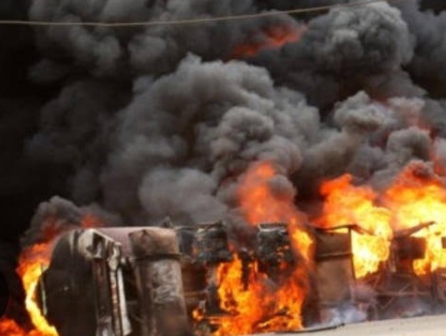Fuel tanker explosion: How to save yourself from harm

Photo credit: BBC
Just barely a few months after a tanker on October 15, 2024, exploded near Majiya village, Taura Local Government Area of Jigawa State claiming over 180 lives, and injured over 81 persons, another one happened again in Suleja, Niger State and claimed at least 90 persons. This explosion occurred after a tanker truck carrying 60,000 liters of gasoline crashed and people gathered to collect the spilled fuel.
The result was tragic and led to the loss of lives and severe injuries to those who came to pack spilled fuel. This incident serves as a grave reminder of the dangers associated with fuel tanker accidents, also this habit of people collecting spilled fuel after a tanker crash highlights the critical need for public awareness and education on how to stay safe in such situations.
READ ALSO: Lagos explosion not caused by oil pipeline vandalism, says NEMA
From bachelor’s degree to doctorate…see University courses upgraded by NUC
According to Dailytrust, in Nigeria, over 300 persons have lost their lives in to fuel tanker explosion which is a far larger figure than the 27 lives lost in the California fire that lasted for many days. This shows a clear case of the protection of lives and the value placed on humanity.
The ratio is unbalanced and it’s so unfortunate that such lives were lost in these avoidable incidents. This calls for the need for a thorough knowledge of what to do to keep safe in such situations.
Possible causes of fuel explosion
You need to understand that fuel tanker explosions are often characterized by a series of events, such as a collision, faulty brakes, and tires which can increase the risk of accidents; reckless driving, speeding, and fatigue from truck drives. Poor road conditions, adverse weather inadequate lighting, tanker rupture leading to fuel leakage, highly inflammable fuel spills onto the road or surrounding area, and a spark from any source (e.g., a vehicle engine, a cigarette, static electricity) that can ignite fuel vapors. All these can result into powerful explosions and intense fire, posing a significant threat to lives and property.
What to do to save yourself from harm
Avoid gathering at accident scenes
One Of the most critical lessons is to never approach a fuel tanker accident scene. The temptation to collect spilled fuel is extremely dangerous. As seen in Niger, this can lead to catastrophic consequences.
Maintain a safe distance
If You witness a fuel tanker accident, immediately move away from the area. The distance should be as far as possible to minimize the risk from the blast, fire, and flying debris.
Do not handle spilled fuel
Under no circumstances should you attempt to collect or handle spilled fuel. The risk of ignition and explosion is extremely high.
Evacuate immediately
If you are near a fuel tanker accident, evacuate the area as quickly as possible. Do not attempt to retrieve personal belongings.
Seek safe shelter
If evacuation is not possible, find a sturdy building or structure to shield yourself from the blast and fire.
Stay low to the ground because of an explosion, and stay low to the ground to avoid being hit by debris or the shock wave.
Cover your face and body
Protect yourself from the heat and flames by covering your face and body with any available material, such as clothing or a blanket.
A collective responsibility of everyone
Though it’s important to know what to do during a fuel tanker explosion, prevention of incident occurrence is better and more crucial. It is also a collective responsibility of everyone and requires concerted effort from various stakeholders.
Tanker companies must ensure their vehicles are well-maintained and operated by qualified drivers.
Drivers on the road should adhere to traffic rules, avoid speeding, and prioritize safety.
Governments should invest in road infrastructure and ensure proper signage and lighting.
Awareness campaigns and educational programs can help educate the public about the risks of fuel tankers. The National Orientation Agency (NOA) should work towards proper sensitization of persons using the various media outlets.

